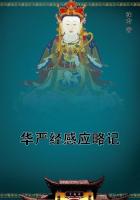For this reason this rough warrior hated monks exceedingly, especially those of Turpenay, who would not allow themselves to be robbed of their rights either by force or stratagem. He was well pleased at the ecclesiastical schism, and waited the decision of our abbey, concerning which pope they should choose, to pillage them, being quite ready to recognise the one to whom the abbot of Turpenay should refuse his obedience. Since his return to his castle, it was his custom to torment and annoy the priests whom he encountered upon his domains in such a manner, that a poor monk, surprised by him on his private road, which was by the water-side, perceived no other method of safety then to throw himself into the river, where, by a special miracle of the Almighty, whom the good man fervently invoked, his gown floated him on the Indre, and he made his way comfortably to the other side, which he attained in full view of the lord of Cande, who was not ashamed to enjoy the terrors of a servant of God. Now you see of what stuff this horrid man was made. The abbot, to whom at that time, the care of our glorious abbey was committed, led a most holy life, and prayed to God with devotion; but he would have saved his own soul ten times, of such good quality was his religion, before finding a chance to save the abbey itself from the clutches of this wretch. Although he was very perplexed, and saw the evil hour at hand, he relied upon God for succour, saying that he would never allow the property of the Church to be touched, and that He who had raised up the Princess Judith for the Hebrews, and Queen Lucretia for the Romans, would keep his most illustrious abbey of Turpenay, and indulged in other equally sapient remarks. But his monks, who--to our shame I confess it--were unbelievers, reproached him with his happy-go-lucky way of looking at things, and declared that, to bring the chariot of Providence to the rescue in time, all the oxen in the province would have to be yoked it; that the trumpets of Jericho were no longer made in any portion of the world; that God was disgusted with His creation, and would have nothing more to do with it: in short, a thousand and one things that were doubts and contumelies against God.
At this desperate juncture there rose up a monk named Amador. This name had been given him by way of a joke, since his person offered a perfect portrait of the false god Aegipan. He was like him, strong in the stomach; like him, had crooked legs; arms hairy as those of a saddler, a back made to carry a wallet, a face as red as the phiz of a drunkard, glistening eyes, a tangled beard, was hairy faced, and so puffed out with fat and meat that you would have fancied him in an interesting condition. You may be sure that he sung his matins on the steps of the wine-cellar, and said his vespers in the vineyards of Lord. He was as fond of his bed as a beggar with sores, and would go about the valley fuddling, faddling, blessing the bridals, plucking the grapes, and giving them to the girls to taste, in spite of the prohibition of the abbot. In fact, he was a pilferer, a loiterer, and a bad soldier of the ecclesiastical militia, of whom nobody in the abbey took any notice, but let him do as he liked from motives of Christian charity, thinking him mad.
Amador, knowing that it was a question of the ruin of the Abbey, in which he was as snug as a bug in a rug, put up his bristles, took notice of this and of that, went into each of the cells, listened in the refectory, shivered in his shoes, and declared that he would attempt to save the abbey. He took cognisance of the contested points, received from the abbot permission to postpone the case, and was promised by the whole Chapter the Office of sub-prior if he succeeded in putting an end to the litigation. Then he set off across the country, heedless of the cruelty and ill-treatment of the Sieur de Cande, saying that he had that within his gown which would subdue him.
He went his way with nothing but the said gown for his viaticum: but then in it was enough fat to feed a dwarf. He selected to go to the chateau, a day when it rained hard enough to fill the tubs of all the housewives, and arrived without meeting a soul, in sight of Cande, and looking like a drowned dog, stepped bravely into the courtyard, and took shelter under a sty-roof to wait until the fury of the elements had calmed down, and placed himself boldly in front of the room where the owner of the chateau should be. A servant perceiving him while laying the supper, took pity on him, and told him to make himself scarce, otherwise his master would give him a horsewhipping, just to open the conversation, and asked him what made him so bold as to enter a house where monks were hated more than a red leper.
"Ah!" said Amador, "I am on my way to Tours, sent thither by my lord abbot. If the lord of Cande were not so bitter against the poor servant of God, I should not be kept during such a deluge in the courtyard, but in the house. I hope that he will find mercy in his hour of need."















